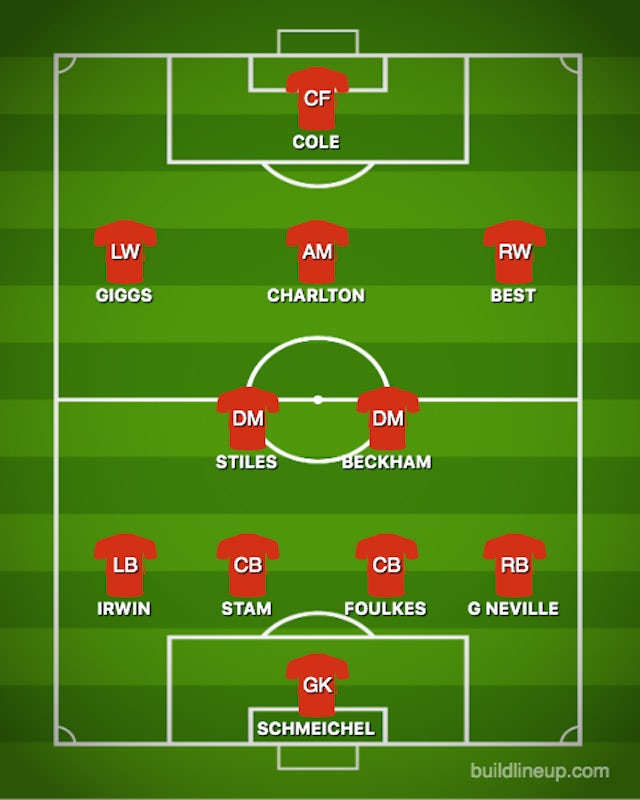May 27 is a significant date in the illustrious history of Manchester United.
It was on this date in 1909 that Sir Matt Busby was born - the man who would go a long way to putting the club on course to being one of the biggest in the world.
The Busby Babes are a team steeped in legend and tragedy, having been decimated by the Munich Air Disaster, which also nearly claimed the life of Busby himself.
The Scot was one of the lucky ones to survive, though, and 10 years later had built another great team which became the first English side to lift the European Cup in 1968.
Ninety years to the day after Busby was born, United scaled even greater heights under another great Scottish manager, with an unforgettable late 2-1 triumph over Bayern Munich handing Sir Alex Ferguson's side the 1999 Champions League trophy, completing an unprecedented treble in the process.
Both of those teams - Busby's 1968 European Cup winners and the treble-winners of 1999 - are among the best this country has ever produced, and to mark Busby's birthday and the anniversary of the '99 final, here Sports Mole has created a combined XI from the two sides.
The only rule for selection was that all players must have featured in either final, which immediately rules out the likes of Denis Law, Roy Keane and Paul Scholes - all of whom would have made the cut if eligible.

There are duels between legendary figures in United history throughout this XI, but as good as 1968 goalkeeper Alex Stepney was, the decision to give Peter Schmeichel the gloves was a relatively straightforward one.
The Great Dane is one of the best goalkeepers in football history and captained the 1999 team, memorably coming up for the corner which led to United's equaliser and then celebrating the winner moments later with a cartwheel as his career at the club came to an end in the best possible fashion.
There are two stalwarts from '99 at full-back too, with Gary Neville and Denis Irwin comfortably seeing off competition from Shay Brennan and Tony Dunne respectively.
Bill Foulkes is the first from the class of '68 to get the nod, helping United to success over Benfica at the age of 36. A survivor of the Munich crash, Foulkes went on to play 688 times for the club - a tally bettered by only three players.
Alongside him is a man who made his impact in a much shorter spell, and it was the addition of Jaap Stam in 1998 that went a long way towards turning United into a team capable of winning every major trophy they entered during his debut season.
It is the midfield which is hurt most by the stipulation that only those who played in the final are eligible for selection; Keane memorably missed out through suspension having produced one of the most inspirational individual displays in the semi-final, while Scholes was also banned in 1999 - although he did play in another successful final nine years later.
Ferguson chose David Beckham as his central midfielder alongside Nicky Butt in the absence of his first-choice pairing, and if it is good enough for him then it is good enough for us too.
Beckham was, of course, more famed for his crossing from the right, but he played the 'quarterback' role on a number of occasions during his career and beats Pat Crerand to that spot in this XI, if only for his contribution of supplying the two corners for the United goals in 1999.
With Beckham's selection focused mainly on distribution he needs a destroyer alongside him, and they do not get much better than Nobby Stiles in that role, the World Cup winner edging out Butt alongside Beckham.
Ryan Giggs was actually chosen to play on the right in 1999, with Jesper Blomqvist on the left, but we have restored the Welshman to his favoured position as part of a devastating trio behind the striker.
United's all-time record appearance-maker Giggs is alongside the man who is second in that list, and was also the club's leading scorer for decades in Sir Bobby Charlton - a man whom many would consider United's greatest ever player.
Charlton scored twice in the 1968 final against Benfica, while George Best - another who could challenge for the crown of United's greatest ever - scored once and produced a dazzling display which went a long way to him winning the Ballon d'Or that year at the age of only 22.
While that trio were all shoo-ins for this team, the centre-forward role was more challenging, even with Law's absence - he was injured for the semi-finals and final in 1968 - taking away arguably the best choice of the lot.
Brian Kidd led the line in 1968 and got himself on the scoresheet, while legendary partnership Dwight Yorke and Andy Cole started in 1999.
Of course, that final is best remembered for the forwards who did not start the match - Teddy Sheringham and Ole Gunnar Solskjaer getting the late goals - but for this position we took the quality of the player as a whole into account and settled on Cole.








